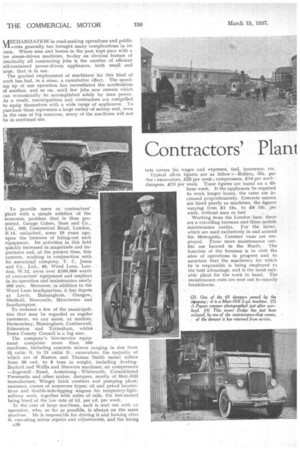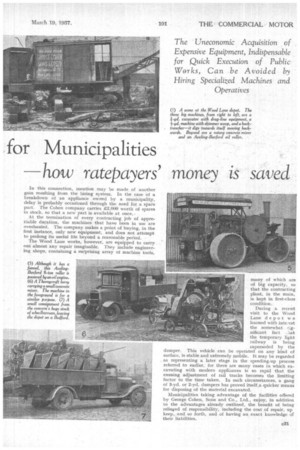Contractors' Plant for Municipalities
Page 80

Page 81

If you've noticed an error in this article please click here to report it so we can fix it.
how ratepayers' money is saved
UIECHANIZATION in road-making operations and public .V.I.works generally has brought many complications in its rain. Where men and horses in the past kept pace with a :ew steam-driven machines, to-day an obvious feature of ?ractically all contracting jobs is the number of efficient ;elf-contained power-driven appliances, both small and Large, that is in use.
The gradual employment of machinery for this kind of work has had, in a sense, a cumulative effect. The speeding up of one operation has necessitated the acceleration of another, and so on, until few jobs now remain which can economically be accomplished solely by man power. As a result, municipalities and contractors are compelled to equip themselves with a wide range of appliances. To purchase these represents a large outlay of money and, even in the case of big concerns, many of the machines will not be in continual ure.
To provide users or contractors' plant with a simple solution of the economic problem that is thus presented, George Cohen, Sons and Co., Ltd., 600, Commercial Road, London, E.14, embarked, some 10 years ago, upon the business of hiring-out such equipment. Its activities in this field quickly increased in magnitude and importance and, at the present time, this concern, working in conjunction with its associated company, .T. C. Jones and Co., Ltd., 95, Wood Lane, London, W.12, owns over £100,000 worth of contractors' equipment and employs in its operation and maintenance nearly 300 men. Moreover, in addition to the Wood Lane headquarters, it has depots at Leeds, Birmingham, Glasgow, Sheffield, Newcastle, Manchester and Southampton.
To instance a few of the municipalities that may be regarded as regular customers, we can name, at random, Bermondsey, Birmingham, Camberwell, Edmonton and Tottenham, whilst Essex County Council is a big user.
The company's hire-service equipment comprises more than 500 machines, including concrete mixers ranging in size from 3i cubic ft. to 21 cubic ft.; excavators, the majority of which are of Ruston and Thomas Smith make; rollers from 30 cwt. to 8 tons in weight, including AvelingBa.rford and Walls and Steevens machines; air compressors —Ingersoll Rand, Armstrong Whitworth, Consolidated Pneumatic and other makes; dumpers, mostly of Muir-Hill manufacture; Winget brick crushers and pumping plant; rammers; cranes of numerous types; oil and petrol locomotives and double-side-tipping wagons for temporary-lightrailway work, together with miles of rails, the last-named being hired at the low rate of ld. per yd. per week.
In the case of large machines, each is sent out with an operative, who, so far as possible, is always on the same machine. He is respons:ble for driving it and looking after it, executing minor repairs and adjustments, and the hiring
c30 rate covers his wages and expenses, fuel, insurance, etc.
Typical all-in figures are as follow :—Rollers, 35s. per day ; excavators, £25 per week ; compressors, 1_4 per weel dumpers, £18 per week. These figures are based on a 48hour week. If the appliances be required to work longer hours, the rates are increased proportionately. Concrete mixers sire hired purely as machines, the figures varying from El 15s. to 46 10s. per week, without man or fuel.
Working from the London base, there are a travelling foreman and three mobile maintenance outfits. For the latter, which are used exclusively in and around the Metropolis, Commer vans are employed. Three more maintenance outfits are located in the North. The function of the foreman is to visit the sites of operations in progress and to ascertain that the machinery for which he is responsible is being employed to the best advantage, and is the most suitable plant for the work in hand. The maintenance vans are sent out to remedy breakdowns. In this connection, mention may be made of another gain resulting from the hiring system. In the case of a breakdown of an appliance owned by a municipality, delay is probably occasioned through the need for a spare part. The Cohen company carries £2,000 worth of spares in stock, so that a new part is available at once.
At the termination of every contracting job of appreciable duration, the machines that have been in use are overhauled. The company makes a point of buying, in the first instance, only new equipment, and does not attempt to prolong its useful life beyond a reasonable period.
The Wood Lane works, however, are equipped to carry out almost any repair imaginable. They include engineering shops, containing a surprising array of machine tools, many of which are of big capacity, so that the contracting plant, in the main, is kept in first-class condition.
During a recent visit to the Wood Lane depot we learned with inte.•est the somewhat significant fact at the temporary light railway is being superseded by the dumper. This vehicle can be operated on any kind of surface, is stable and extremely mobile. It may be regarded as representing a later stage in the speeding-up process referred to earlier, for there are many eases in which excavating with modern appliances is so rapid that the ensuing adjustment of rail tracks becomes the limiting factor to the time taken. In such circumstances, a gang of 3-yd. or 2-yd. dumpers has proved itselta quicker means for disposing of the material excavated.
Municipalities taking advantage of the facilities offered by George Cohen, Sons and Co., Ltd., enjoy, in addition to the advantages already outlined, the benefit of being relie,yed of responsibility, including the cost of repair, up keep, and so forth, and of having an exact knowledge of their liabilities.
























































































































































